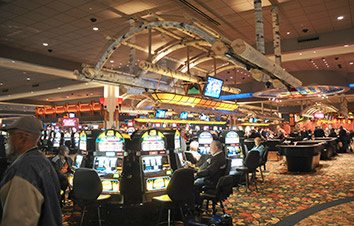Subscriber Benefit
As a subscriber you can listen to articles at work, in the car, or while you work out. Subscribe NowIndiana's casinos could see their tax bills cut by tens of millions of dollars under a proposed overhaul plan that a legislative committee approved Thursday, with local governments in casino communities possibly taking the biggest hit.
The House Ways and Means Committee voted to add the tax changes to a bill that would would let riverboat casinos move onto land and and permit live dealers for table games at the state's two horse track casinos.
Bill supporters say the state needs to help Indiana's casinos as they face growing competition from neighboring states that has contributed to big declines in business and the loss of hundreds of jobs.
The proposed tax changes to start in 2017 would cut annual tax payments from the state's 13 casinos by $120 million, or 18 percent, according to estimates by Ways and Means Committee staff. That would come from eliminating the admission taxes now paid by the casinos and adjusting wagering taxes so that the smaller casinos would see significant savings.
Anticipated losses in state tax revenue under the changes would be offset by eliminating a $48 million state subsidy for local government agreements with the casinos for tax payments.
The drop in local tax revenue from the casinos will certainly be a point of debate if the bill clears the House next week and moves on to the Senate for consideration.
Ways and Means Committee Chairman Tim Brown said local governments and casinos would have through 2016 to reach new tax agreements.
"We hope that everybody has a come-together moment and works well together for their local communities," Brown, a Crawfordsville Republican, said.
Mike Smith, president of the Casino Association of Indiana, didn't have any immediate comment on the tax proposal, which was first made public Thursday.
Other major provisions of the bill would give the 10 riverboats along Lake Michigan and the Ohio River the option to build new on-land casinos on property near their current locations. Owners of the Evansville and Gary casinos have especially pushed for that change, saying they could build better facilities that could attract more customers.
The proposal also would allow the two horse track casinos — Hoosier Park in Anderson and Indiana Grand in Shelbyville — to have live dealers for table games such as blackjack that are now run by computers.
Similar proposals have failed in the Legislature in recent years, and casino advocates still must overcome potential opposition from Republican Gov. Mike Pence and some legislators who are against steps they regard as an expansion of gambling.
State tax revenue from Indiana's casinos has declined by about 28 percent, or $185 million, since 2010, with the state revenue forecast projecting an additional 12-percent drop in the coming two years.
The committee changes made Thursday would require the owner of the two neighboring Gary riverboats to give up one of the casino's licenses if it builds an on-land facility. Brown said the Legislature would decide in the future whether that license could be issued again.
Brown said local governments would have 18 months to negotiate new agreements with the casinos, after which the state Gaming Commission could establish casino payments to local governments.
"Right now, over this competition, revenue decline, it's been the state that's borne all the burden on that," Brown said. "Everybody needs to work together on this."Local economic agreements between the state’s casinos and local communities would be scrapped and the admissions tax that provides revenue to local governments eliminated under a bill an Indiana House committee approved Thursday.
Communities would have until Jan. 1, 2017, to reach new agreements with their casinos. If those negotiations failed, the Indiana Gaming Commission would serve as an arbiter and set a local development fee of between 2 percent and 7 percent of the casino’s gambling profit.
Please enable JavaScript to view this content.

